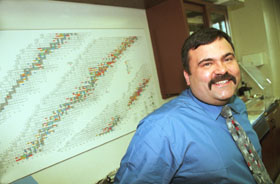
PHOTO: OWEN EGAN
Joseph Vincelli: A strong grip on safety
Joseph Vincelli, radiation safety officer and occupational hygienist, is something of an occupational hazard himself.
When he greets you at the door of 3534 University, home of the Environmental Safety Office, and warmly extends his hand, beware. You are entering a high-risk area. Vincelli's handshake has the force of a vice-grip.
So much so that his boss, Wayne Wood, manager of the ESO, put a poster on his colleague's door prohibiting the practice: it's the drawing of two hands in a shake with a fat, black line through it. Too late for this visitor.
But Vincelli tries to make sure that his warnings about radioactivity don't come too late. The risk to health posed by radioactive materials, after all, exceeds the momentary discomfort of a compressed hand.
Warnings in this safety officer's mind, however, don't mean hanging masses of signs bearing the well-known symbol of radioactivity. Vincelli believes in education; through the three six-hour-long seminars he gives annually, he wants every one of the roughly 1,000 McGill researchers on both campuses who use radioactive material to know how to assess the risks in their labs, keep them to a minimum and to use the appropriate means of protection.
Patience, diplomacy, support from above and, occasionally, carrying a big stick are what's needed in this job, according to Vincelli, who, with the assistance of radiation technicians Bob Robb and Danny Alu, is responsible for the inspection of the University's 300 radioisotope-licensed labs.
Vincelli's goal is to use knowledge to help those too fearful of working with radioisotopes to overcome their fear and to convince those too arrogant to scrutinize their lab practices properly to gain a little humility in the name of common safety.
"When you're in control of a situation, you're not afraid," he says. "My job is to give them the tools and then let them decide how and when to use them."
Occasionally, education and patience go nowhere. Once, for instance, Vincelli, with Wood's blessing, had to threaten to change the lock of the lab of one delinquent researcher, who had already received a warning letter about his lax approach to safety. After that "he did really, really well," says Vincelli.
Vincelli's path to the ESO was a relatively straight one once the road to vet school appeared to be closed. Son of a mechanic father and "wonderful cook" of a mother, and relative of the famous Westmount Vincelli Gardeners, this first-generation Canadian followed his love of botany into studying biology at Concordia University where he discovered his "fascination" with radiation in a radiation biology course.
Later, while working as a lab technician at the Royal Victoria Hospital, Vincelli found that lab workers were poorly trained in handling radioactive materials, such as the isotopes used to mark cells in, for instance, experiments on metabolism.
Vincelli, who was injecting radioisotopes into patients, taught himself the necessary precautions, for his own safety and in order to explain the risks to patients.
"I was concerned regarding the public health issues and the occupational health issues. I realized that training has a big role to play."
Vincelli's interest in public and occupational health led to a job at the Environmental Safety Office on condition that he do a Master's in Occupational Health at McGill. His concern for the environment extends beyond the McGill campuses. His home, located on a corner lot in Ahunsic, is a "jungle" of birds, flowers, trees and vegetables. So much so that every fall, after he has made his tomato sauce, he gives away the rest of the tomatoes to the office.
But Vincelli's love for nature has its limits. Last summer, eight uninvited guests of the black and white and perfumed variety made themselves at home every evening on the lawn, merrily digging out the worms from Vincelli's completely organic lawn (he has three composters cooking at all times!). "When my girlfriend said: 'It's me or the skunks,' I called the city and set the cages." Even nature presents occupational hazards.
Bronwyn Chester
| 


